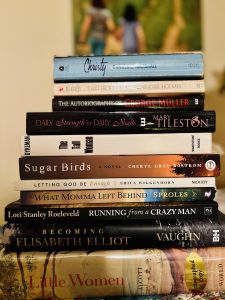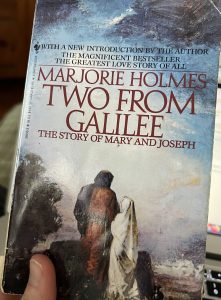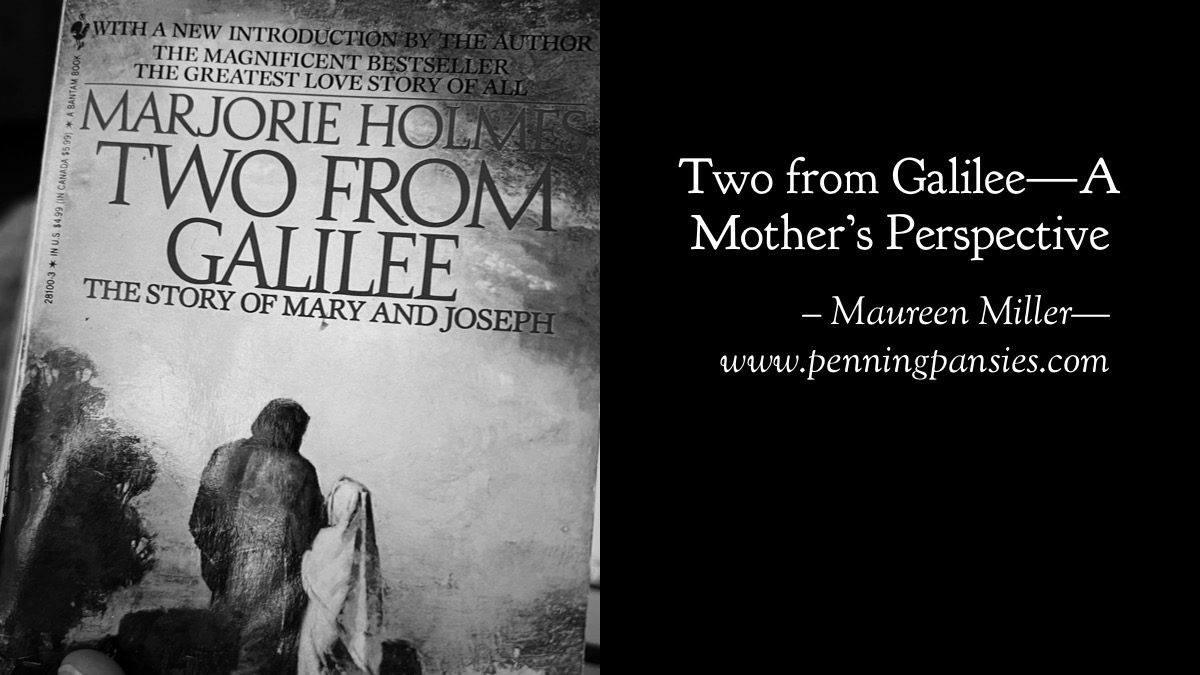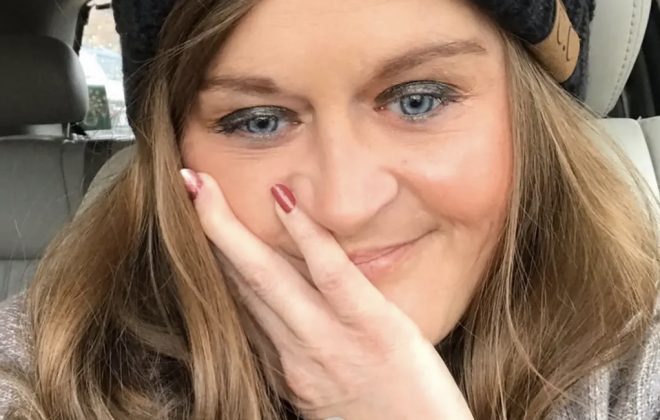Two from Galilee–A Mother’s Perspective

“We read to know we are not alone.”
~~C.S. Lewis’s character in William Nicholson’s play, Shadowlands~~
*******
As part of my 2022 goal to read ten pages per day, one book at a time, from a variety of pre-chosen books, I also intend to offer a book review, based on my own opinions and personal thoughts, after completing each one.
*******
Here, on the 19th day of the first month of the new year, I’ve just finished my first book of 2022, the historical novel Two from Galilee–The Story of Mary and Joseph by Marjorie Holmes.

This is a reread for me, as are some of the other books I’ve chosen for these 365 days. I read it nearly a lifetime ago it seems–when I was a college freshman, single and unaware of the twists and turns that lay ahead of me on life’s journey, still standing on the threshold of adulthood, not yet having stepped through that doorway.
I remember weeping in my quiet dorm room at Asbury College when I came to the part where the angel of the Lord overshadows a teenage girl, when she becomes miraculously pregnant by God. As Holmes so poignantly portrays–
“‘My God, my God!’ [Mary] cried, and the sweat ran down her limbs. And so it was that Mary knew God and was one with God and became at once his child, his mate and his mother, and the miracle was achieved” (p. 81).
When I first read those words, I did not yet know the joys and trials of marriage. I did not know the coming hardship of infertility–could not foresee the barren years that lay ahead. But I loved the Lord, and these words touched me to my core. I remember thinking, Imagine. To say ‘Yes’ to God, to trust Him enough, knowing the persecution that would come. The questions that were sure to follow. The judgment that would certainly be passed.
And I remember, too, feeling a sense of longing–to experience life stirring within, believing every life to be a miracle. One day, I told myself. One day you’ll also know the joy of pregnancy, though in no miraculous manner as Mary experienced.
Yes, this part of Holmes’ book particularly moved me then, and I remember it still, all these years later.
Reading Two from Galilee again, however, I was emotionally stirred in other ways, by other parts of this beautiful story–probably because I’m not a young, unwed woman of eighteen but a 52-year old mother and grandmother. Thus, Marjorie’s words–her themes, three in particular–moved me differently.
The first theme has to do with Holmes’ portrayal of the miracle of adoption.
Although I thought I’d bear children like most women when I read her book the first time, carrying a baby in my womb was not to be. Still, I experienced the joy of becoming a parent in God’s perfect manner–through the adoptions of our three children. Thus, Bill and I both came to know even better what it must have been like for Joseph–to have been chosen to be Jesus’s adoptive father, which is no small matter.
As Joseph says near the end of the story, when Jesus has just been born and the reality of his place, his noble position, as God’s Son’s earthly father–
“Joseph laughed, over the pain of his blind adoration. His child. If not the child of his loins, yet it was still the child of his love… ‘My son,’ he said, smiling…” (p. 204).
This part moved me so, even more than when I read these words before–mostly because I now understand this in my heart. Just as God chose Jospeh to be Jesus’s daddy, so, too, He chose Bill to be our children’s earthly daddy, me their earthly mother. What a blessing! What a gift!
A second theme has to do with Marjorie Holmes’ portrayal of the imperfections of motherhood.
Of course I couldn’t foresee my own–my many–shortcomings as a mom when I read Two from Galilee all those years ago. On the contrary, I’m quite sure I had lofty notions about how I’d be the perfect mother one day.
Many of us know. Nothing humbles us more then, well… being a mother. I know that now, all too well. How I react impatiently. Over talk. Fall short. Fail to say the right things. Fail by saying the wrong things. I could go on…
I recently rewatched the 1983 movie Terms of Endearment (which I don’t recommend without a box of tissues). Though I’d seen this film years ago when I was a teenager, and though I’d cried buckets from the sheer agony portrayed by Debra Winger’s character, I was especially moved this time while watching a particular scene called “Emma’s Goodbyes.” Here, a dying mother tries to convince her angry child that she believes he loves her, that he never has to wonder or worry. I remember thinking, This scene is particularly painful to me now because I am a mother. I better understand Emma’s pain in my heart, how difficult it must be to have to say goodbye–to want to say it all before time runs out, to want to say it right.
Similarly, when I read the part in Two from Galilee where Mary’s mother Hannah finally realizes she truly does believe her daughter’s words–that she is indeed carrying within her womb the long-awaited Messiah–it’s too late. Mary has left with her husband Joseph for Bethlehem, and Hannah has lost her opportunity to share with her daughter that she, too, believes. Holmes portrays this poignantly, and my mother’s heart understood. Reminded of the prophecy that the Messiah would be born in Bethlehem, this truth suddenly hits Hannah.
“‘Bethlehem! She who is in travail.’ And as the great knowledge awoke within her, began to beat and break within her, Hannah’s face likewise broke, dissolved. ‘My God, my God,’ she cried, and lifted its anguish to heaven, ‘wherefore have you denied me this truth so long?’… ‘I must tell her, I must catch them and tell her before it’s too late!’… ‘I believe. Oh, Mary, I too believe’ (pp. 181, 182)!
Some things–certain emotions–we just can’t fathom, feel in our hearts, until we’ve experienced them for ourselves. This mother’s love for her daughter, the missed opportunity to share in the miracle due to disbelief, could only be felt in my own heart in this manner because I, too, have had times too many to count when I’ve failed. When I’ve panicked, thinking I won’t have an opportunity to make things right. When I’ve stumbled on words in my attempt to help a child understand. When I’ve laid awake at night, fitful and afraid, fretting over a missed opportunity.
Finally, the theme of releasing one’s child to God–to His will–pierced my heart.
We all want the best for our children, our grandchildren. And if we’re honest, we desire to help God’s best along, which, too often, becomes meddling. Right? Am I the only one who thinks I know best? But God’s plan may or may not look like my own. In fact, most often His plan looks a whole lot different, though it’s so much better, even when it’s painful.
Mary and Jospeh both had to face–had to live with–the reality of their son’s purpose, something that undoubtedly caused anguish. Enough to pierce his mother’s heart, as the scriptures tell us.
Marjorie Holmes beautifully portrays this, and the message–though certainly unique for Messiah–is for all parents: We must trust the Lord with our children. She writes–
“‘Hush, my love, my little wife, [Joseph] said. ‘Does not every mother who bears a son know that he must die one day? Aren’t there already a thousand crosses upon the hills of Judah? Doesn’t every man who walks this earth carry his cross with him every day?’ He turned and looked a moment at the manger. ‘This is our cross, Mary. Yours and mine–for you know how much I love him too’ (p. 213).”
And so true for us, moms. Dads. Grand parents. This is both our joy and our sorrow–the beauty and the anguish of loving another so much, yet having to hold him or her loosely before the One who loves our little ones (no matter how old) the most.
After all, that love–His love–was so great that…
“…He gave His one and only Son, that whoever believes in him shall not perish but have eternal life” (John 3:16 NIV).
Amen!

Does one of these themes particularly speak to you? I would love for you to share your thoughts, and if you’ve read this book, please share a short review in the comments. Just a sentence or two is fine.
Tags In
Search
Subscribe to Blog via Email
Categories
- At Home (173)
- God's Word (180)
- His World (198)
- Uncategorized (5)




